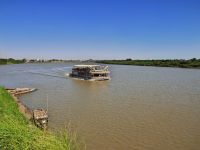A parliamentary vote on a controversial deal concerning Israel’s natural gas reserves will temporarily be delayed until a new antitrust commissioner is appointed, Prime Minister Benjamin Netanyahu announced Monday.
His decision came a day after news broke that a large natural gas field was discovered offshore from Egypt, casting doubts on the viability of the current terms of the deal, which were already under fire by activists and opposition lawmakers.
Economy Minister Aryeh Deri said last week that he was leaning toward refraining from bypassing the Antitrust Commission.
Deri told Knesset reporters last Wednesday that he would rather wait until the appointment of a new antitrust commissioner in several weeks’ time, rather than exercise his authority to bring the agreement to a vote without a trust-buster in office.
The previous commissioner, David Gilo, tendered his resignation in May, saying that aspects of the deal resembled a monopoly, and calling for the local natural gas market to be opened to increased competition. His resignation comes into effect at the beginning of September.
Article 52 of the Antitrust Law enables Deri as economy minister to bypass the commissioner and approve the deal between Israel and a US-Israeli energy consortium to develop Israel’s offshore fields, which boosters say will bring hundreds of billions of shekels into state coffers.
Earlier this month, the cabinet approved the disputed natural gas deal, paving the way for the Knesset to vote on the measure, despite criticism that the arrangement favored the energy companies.
On Sunday, Italian energy group Eni announced it has discovered a “super-giant” natural gas field off Egypt, describing it as the “largest ever” found in the Mediterranean Sea. Eni said the discovery — made in its Zohr prospect “in the deep waters of Egypt” — could hold a potential 30 trillion cubic feet of gas over an area of 100 square kilometers (38.6 square miles).
Israel’s Leviathan gas field, which is estimated at 16 trillion cubic feet, had so far been thought to be the largest in the Mediterranean.
By Adiv Sterman, Stuart Winer








